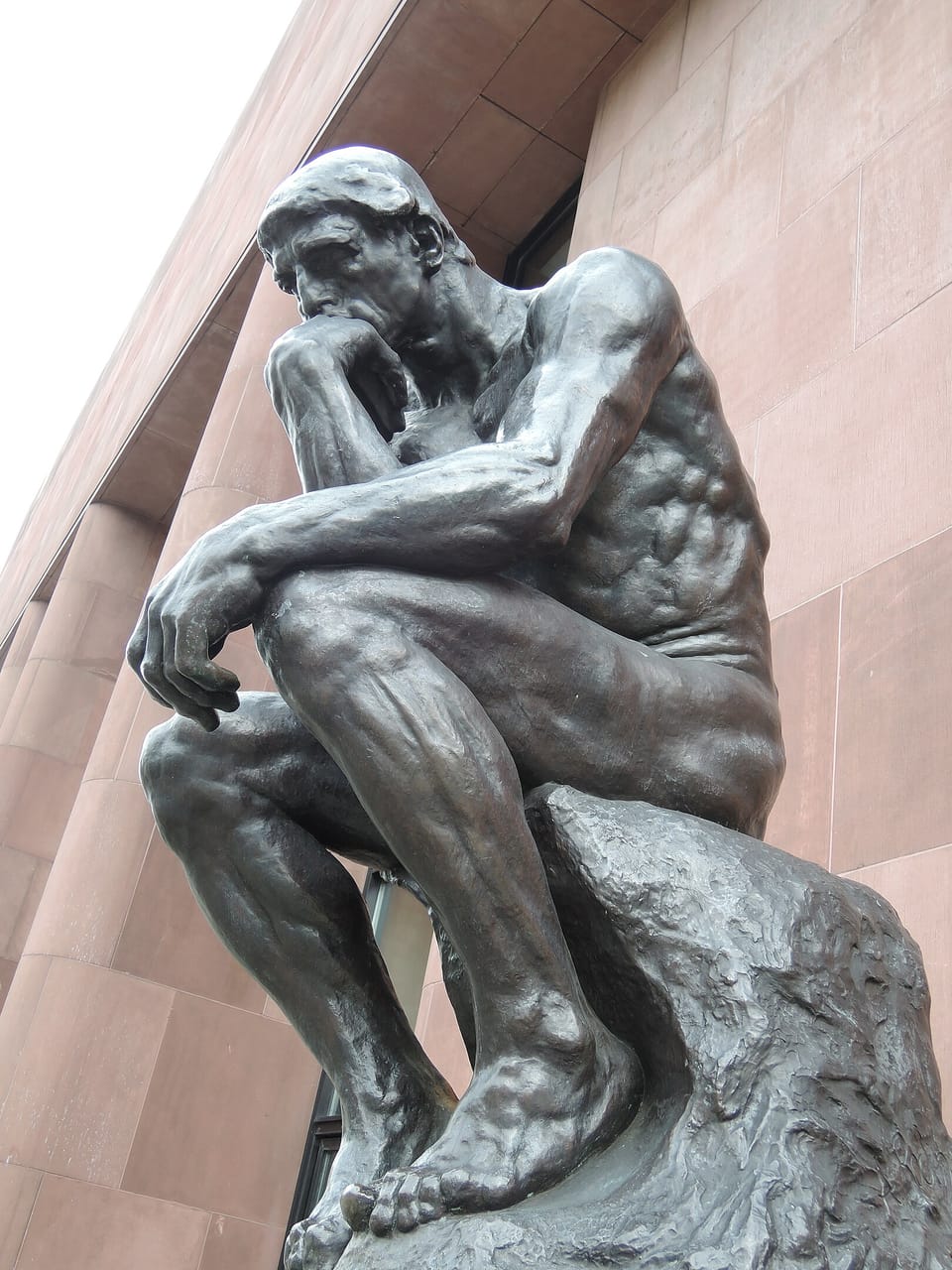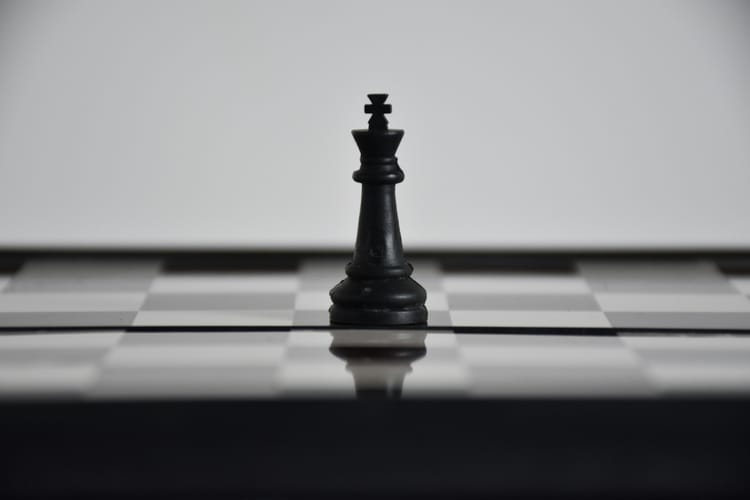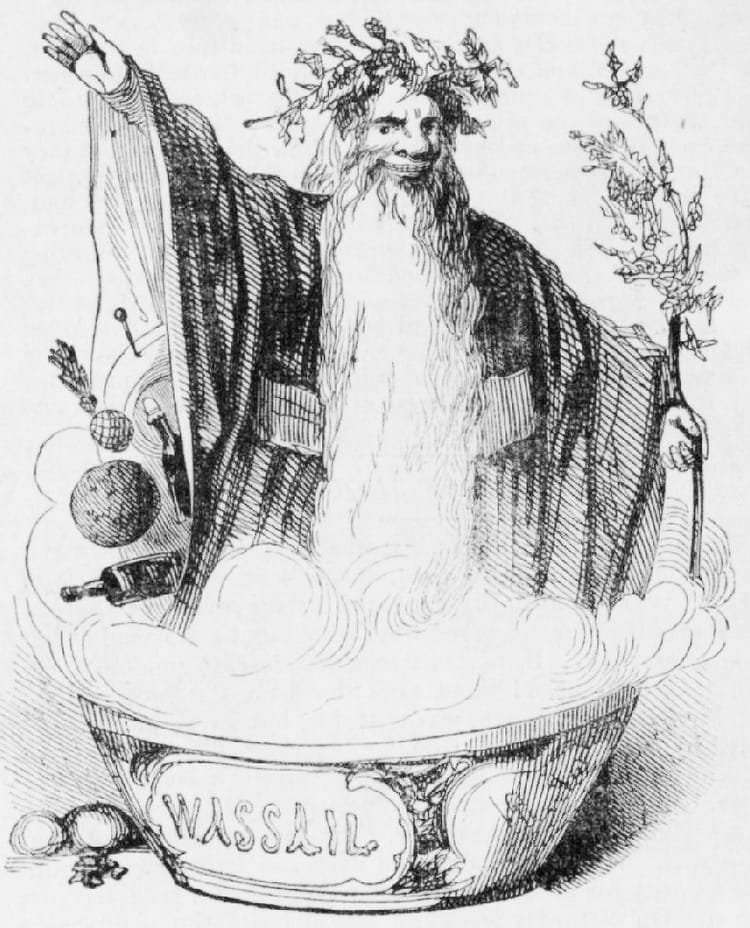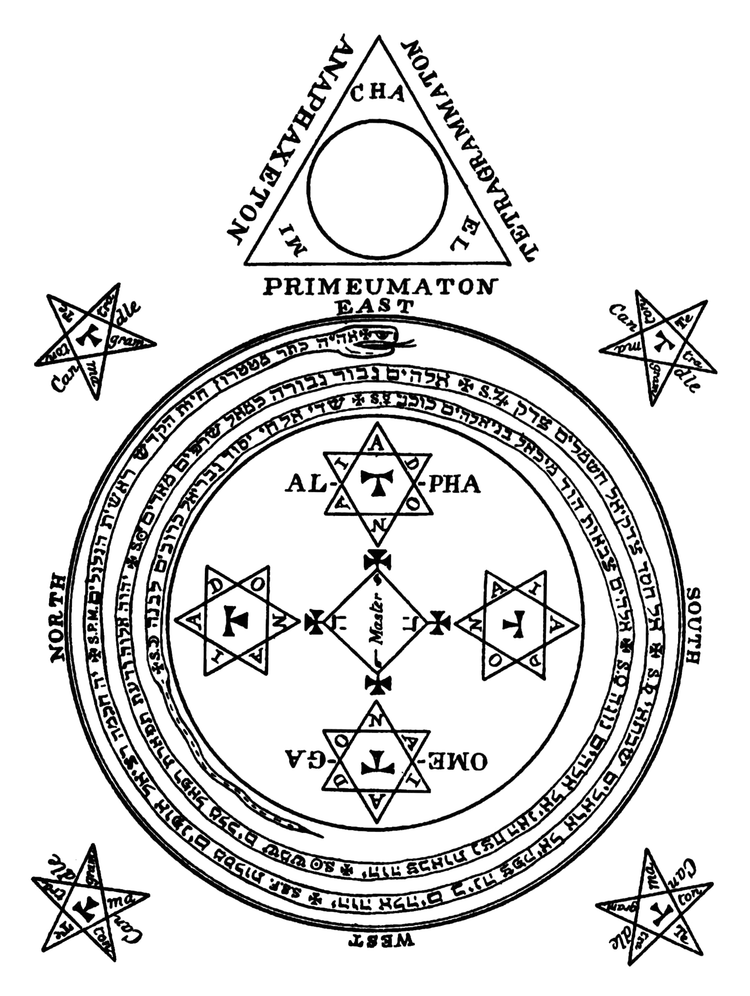New Moon: A relatively brief philosophy of mind, for the ritualist

It's Friday. Hello.
I have a little more time to write today than I have over the past few weeks, but I've referred to this as a "relatively brief" philosophy of mind because given my undergraduate focus on philosophy — and of mind in particular — I know that there will be no satisfactory way for me to even summarize all the classic perspectives that are helpful for considering the field's central question, which is the nature of consciousness. Some people would say the central question is the nature of the mind's relationship to that which is not the mind, i.e. "the outside world" in crude and I would argue misleading terms; but I think these questions are the same when all is said and done. Identifying consciousness depends, like all identity questions, on relational positioning. Consciousness is recognized through interactive processes. And I also think that although someone could assert a difference between consciousness and the mind because the mind seemingly operates to some extent on subconscious information and infrastructure, I personally find that when considering those subconscious aspects on a philosophical level we are only confronted more starkly by what is strange about the conscious aspects. So I am writing today about understanding consciousness as the real kernel of understanding the mind.
I've written posts here before that delve into academic philosophy, usually during the week of the New Moon as I consider it the time for contemplating deep mystery — the time when the absence of light suits looking for hidden truths that bright glare would obscure, just as the absence of the Moon from the night sky lets us see more stars, and just as wintertime sends us turning inward to learn what we cannot when the abundant flow of summer is passing through us. But why this mystery, this week? There are two reasons.
First, somewhat recently my ritualist colleague Siin offered some thought-provoking perspective on altering consciousness for ritual purposes, which she found required asking what consciousness is even though there are no easy answers. As we're in semi-regular dialogue, I found that my response could not effectively fit into a reply on social media or even a comment on her own newsletter, so I'm finally putting that response here instead. I enjoy this opportunity to situate Salt for the Eclipse within a larger conversation.
And second, consciousness is at the heart of why ritual is performed, whether as an esoteric pursuit or as an animist practice. So it's quite important to spend some time reflecting on consciousness if those of us engaged in ritual living intend to understand our own behaviors. If we undergo ecstatic experience, what is doing the experiencing? If we gain occult knowledge, what is doing the knowing? If we are transformed by ritual, what has ontologically happened to our "selves"? If we facilitate creation and relation and abundance, what is the thing within us that then feels connected to other things? If magic is something we witness more through intuition than through our senses, is it all in our mind or is something else at play? If we recognize animacy in all things, is the same thing as recognizing a mind in all things, or not?
I am not going to answer all of those questions today, but I am going to unpack the basic "problem of consciousness" in as few words as I can, even if I miss some important qualifiers along the way; and given my views here, half-formed though they remain, you may be able to apply them to those matters above.
Assumptions & their discontents
In many everyday situations, there can seem no good reason to pick apart what consciousness is. It's not a practical issue. We can make various crucial assumptions about consciousness because then we can most conveniently go about our lives. These assumptions tend to be things like:
- "The things I am conscious of are real things."
- "I am conscious in the same way that every other conscious being is."
- "If any non-human beings are conscious, regardless of whether that consciousness is different from human consciousness, then there is nonetheless some threshold at which consciousness clearly doesn't apply, such as with things that aren't vertebrates, or aren't even animals, or aren't even alive."
- "Whether or not my consciousness continues after death[1], it remains an uninterrupted flow during my lifetime that allows 'me' to always be 'me'."
- "Whether my consciousness is generated by material processes in my body or is placed within my body from an immaterial source, my consciousness itself is clearly not material, otherwise the full, subjective, experiential quality of it could receive objective measurement, which no one has ever achieved."
To be clear from the outset, I find genuine merit in operating from these assumptions in many situations. But without understanding what consciousness really involves, exceptions to these rules can stop us in our tracks, make us act in bad faith, cause us to do great harm, and significantly impair our ability to grow or find our place in the cosmos.
I am going to break each of these assumptions apart, sometimes dragging in well-established hypothetical examples that some of you might already know from casual discourse, not just from philosophy courses — especially if for good or ill you've spent a lot of time reading what people have to say about AI these days. AI will actually come up here, and not just in the usual form of me railing against what's currently referred to as AI or the people who push it. As you will see below, I actually believe there are circumstances in which a real AI would deserve to be afforded the rights of any animate being, which is a core reason why tinkering with such technology is really so dangerous. But my overall purpose in this post is not to dwell on this one application of the philosophy at hand; rather, I'm going to offer some open-ended questions about why the typical assumptions we make for consciousness are not adequate, plus some formal arguments for what's really afoot in some instances.
One principle I'm going to rely upon in this process is pragmatic truth-value. This is a concept rooted in the work of thinkers like William James, and I would define it as this idea: "If relying on the true answer to a particular question does not produce any pragmatic difference in outcome from relying on a false answer, there is no value in trying to differentiate truth from falsehood." Note that this is a far cry from saying the ends justify the means in ethics; it is not an ethical statement. It is ontological, a statement about the nature of reality — and it is epistemological, a statement about what we can know of reality. Essentially, in writing this post I mean to avoid going off into the weeds of debates about consciousness that center around splitting unsplittable hairs. For example, regarding the first assumption that "the things I am conscious of are real things," I do not care whether we live in a digital simulation that we're never going to find out about or be able to escape. In questioning whether the things I'm conscious of are real, I'm instead wondering things like...
"What if my consciousness is an unreliable representation of what's real?", a.k.a. "Am I crazy?"
I use crazy here as a non-pejorative, reclaimed term[2] and I am going to favor it here for a very sincere reason. Namely, it carries the weight of fear. Sometimes we can be crazy without knowing it, which is not necessarily unpleasant, but if we suspect we might be crazy, or we know it to be the case, or maybe even if someone is trying to convince us of it, then experiencing something unreal (or that might be unreal) often feels very frightening. And whether or not you've ever dealt with that sort of scenario in a protracted way, in turn it can feel alarming to question whether everything you consciously encounter does not equate to the real and material situation outside of your sensory awareness.
And that disconnect could really exist, couldn't it? We don't have to be in a simulation created by some other entity for it to still be possible, maybe even likely, that when I see a tree I am not really seeing what the tree is like. My eyes are taking biochemically manufactured information from the stimulus of light, sending this information into my brain, and leaving my brain to interpret this information in some way. Perhaps there is some miraculous way in which I still wind up experiencing the "true image" of the tree, but how can I know this is the case? What if it's only a shadow of what I would experience if I could somehow step out of my own brain and become some godlike observer of the true form of the whole universe?
This is what's basically at stake with the philosopher Plato's allegory of the cave. In this over-told but meaningful story, a man lives his whole life in a cave seeing the shadows of real objects projected on the cave wall by flickering firelight, as these objects are moved behind him by unseen hands. He thinks he knows that all those objects look like, but of course he only knows their silhouettes. When he's released from the cave he's astonished to discover all the detail he was missing. I have many disagreements with Plato but I think this story has become a cliché because it resonates so instantly with a fundamental human concern. Our senses could be so imperfect that we do not experience the world as a being with "better" senses would; or our brains could interpret sensory data imperfectly; or our brains could interpret it perfectly but then not be so adept at representing it truthfully.
And such events occur on a very real and common basis. Not everybody has the same number of functioning senses, and these senses are not retained equally over time. Not everybody's brain performs cognition with the same capacity on all fronts, either. Not everybody's brain is even equally inclined to generate a vivid "picture" of something in one's imagination, or to produce an "inner monologue" of verbal thoughts about something.[3] And sometimes brains will spontaneously hallucinate things that aren't really being sensed. If this is all the case, at some point it must be asked on a fundamental, metaphysical level: what can we know is real within the scope of what we experience?
I have yet to settle on a fully comfortable solution for this. I at least believe it's a cop-out to decide that everything we experience is a hallucination fabricated from scratch; just like simulation theory, it gives us no pragmatically distinct outcome from deciding everything we experience is totally real. In either an all-real or an all-fake setting we still have to conduct our lives in the same way. And crucially, again: we experience just enough discrepancies in our consciousness that this implies some amount of false representation does occur, but it seems to contrast with real representation. Where are we supposed to draw this line? When can we trust our senses, and when can we not?
Usually the best I can manage here is to not assume that something I'm conscious of is always something real, and to instead assume that if other seemingly-conscious beings (a concept I'll come back to further down) also seem to perceive the same thing that I do, then the thing we perceive in common is probably real in some way; there is something there for more than just me to perceive. This leads to the formation of what many people call consensus reality. In a model of consensus reality, we cannot guarantee that what seems real always is so, but we can still operate from common guesswork about what's likely real. Beyond that, we have to settle for uncertainty.
And this leads to unpacking the next assumption that "I am conscious in the same way that every other conscious being is." Because even if you and I each perceive a tree and this means that something we can meaningfully refer to as a tree is probably situated where we see it, your experience from the tree is unknowable compared to my own.
"What if what I see as red is what you see as blue?"
I hate writing this question because it's the kind of clever remark that an undergraduate philosophy student likes to present as if they're the first person to ever ask it. But I also hate being cynical about the matter, because if we're going to talk about consciousness we can't not address such a problem.
It may really be the case that although two humans are both conscious, the actual experience of consciousness is not the same between us. Maybe it's as crude a matter as seeing colors in different ways, such that if we swapped our consciousnesses "into" each others' brains everything would somehow look wrong. Another framing, which appears in the classic 1974 essay "What Is It Like To Be A Bat?" by Thomas Nagel, is the suggestion that as much as we might like to imagine what sensory perception unlike our own is like, it is too unknowable. As much as a human without echolocation may like to imagine how it feels to have echolocation, we just can't imagine it in a way that certifiably reproduces the real experience. By extension, troublingly, as much as we may imagine other people experience consensus reality exactly like we do, maybe they just don't.
After all, colorblindness is a known phenomenon. There are material conditions in which I could see a tree with green leaves and red berries, and those leaves and berries will look visually distinctive to me, whereas someone with red-green colorblindness will not tell their colors apart to the same degree that I do (if at all). Because most people are not colorblind, this is an imperfect example because we could argue that it's a fairly common human experience to see red and green as distinct colors. Consider, though, that different languages do not always have the same number of colors and do not draw semantic lines between identical light wavelengths; consider also that if there can be a material cause for different experiences of color, all bets should really be off if anything about our consciousness exists on an immaterial plane. Leaving aside the Sapir-Whorf hypothesis about the inherent entanglement of language and cognition,[4] it really may be that the general experience of color vision among sighted humans is not actually that generalizable.
This can be upsetting to think about because if my experience of the world is in some way irretrievably siloed from someone else's, there are limits to empathy and connectivity. How can we acknowledge the intrinsic uniqueness of our individual experiences without becoming entropic individualists? Here is one mystery where I really don't have a good answer yet, although I suspect said answer may have something to do with the fact that people with disabilities (myself included) are people first and foremost. The fact that each of us experiences or moves through the world in a way that other people — not even other people with similar disabilities — can know does not preclude acknowledging our humanity or our rights. In other words, if we can't solve how to know my red is your red vs. your blue, maybe pragmatic truth-value dictates we commit to treating each other with respect either way.
Treating someone with respect does of course require that they be classified within the category of beings that deserve respect. And in modern society, a typical requirement for that category is the presence of consciousness, or (if the being is temporarily unconscious) the likelihood of becoming conscious again, or (if the being was once alive and is now dead) the fact that they were previously conscious at some point. So now we must ask...
"Who or what is actually conscious, though?"
This is where we must turn our attention to the assumption that you can set some threshold at which a thing either is inherently conscious, or isn't. And it really isn't that simple at all.
For one thing, it may produce a preposterous or harmful result but a human could of course take the stance that because they don't even know exactly what a fellow human is truly experiencing, they can't guarantee any other humans are conscious. This would be a wholesale rejection of what psychologists refer to as theory of mind, a key stage for children to reach in early development, and some outdated models of autism presume that autistic people actually lack this theory of mind and thus are glaringly un-empathic because we don't recognize that other people are independent agents from ourselves. I can assure everyone that I and any verbal autistic adult I've ever engaged with are all quite aware that each of us does not have the only consciousness in the universe.[5] But unfortunately if someone actually does lack theory of mind this is going to make life very difficult for them and for people who have to interact with them.
Once again, pragmatic truth-value reigns: whether another human is as conscious as me or or simply behaving as a consciousless automaton, it's to everyone's benefit (including my own) if I presume they're really conscious and conduct myself accordingly. It's enough that they seem conscious and that I'm able to recognize that apparent state.
So we can't be overly restrictive about who is afforded consciousness. But where can or should the line be drawn in the opposite direction? What about non-humans? How permissive can we be?
It probably is not a stretch to say that other primates have some form of consciousness. It may not be like human consciousness, but it would be rather strange if we humans uniquely and spontaneously developed consciousness at the same time that we developed the kind of speech that seemingly does set us apart from other life forms.[6] So primates probably are conscious.
Next, there is no clear, empirical reason why a primate brain is more capable of consciousness than another mammalian brain. And given that other mammals behave in ways that suggest they, too, are conscious, we might as well presume they are. And well, the same for birds, and reptiles, and pretty much any other vertebrate animals. We all have brains, and consciousness seems to be related to brains, and we all exhibit neurologically-modulated behavior. Maybe someone could debate whether we're all equally "intelligent" or have different "types" of intelligence, but in my opinion that's tangential here.
What about invertebrates, then? They often still have something we would recognize as brains, but not always, and when they do have brains they develop in rather different ways from vertebrate brains. Invertebrates do at least have nervous systems, though. This implies they have senses, whether or not they "think." Can they consciously experience the world via their senses even if there isn't a central "hub" of that sensory information? Is an ant aware of itself and aware of having experiences? Maybe not, but maybe. And since invertebrates do exhibit some behaviors that are held in common with more-likely-conscious beings, maybe it's best to presume that they carry at least some consciousness, even if it's "less" or distinct.
What about plants? They don't have nervous systems at all. But then again, sensory information is carried through their cells by other means. Likewise, although they don't behave in that many ways that we animals would recognize as suggesting consciousness, there is some implication of agency in where vining plants send their tendrils, or in how cut plants release distress pheremones that warn surrounding plants, or in how flowers present themselves to vibrating pollinators, or in what plants do with mycorhizally exchanged information from the soil. So perhaps plants could in turn not have the same consciousness as animals, but consciousness of some kind.
We can ask the same thing of other non-animal life, and then we can even ask the same thing of entities that have never been alive and cannot be alive. Rocks, clouds, stars. Can they be conscious? Maybe.
Now speaking frankly, I actually am somewhat inclined to draw the line around consciousness as any self-aware experience that is generated by a bodily nervous system. I am too much of a materialist to trust that something without a nervous system could still be conscious in any regard that is worth equating to the consciousness I personally know. I may even not be sure whether an animal like a coral is conscious.
But this is where I would venture to say that we can still distinguish sentience, the ability to sense things, which is an independent concept from whether or not we are aware of sensing things. I would freely extend sentience to any living thing, maybe even to liminal entities like viruses.[7] And then I would argue that even though we may — may — not need to worry about whether non-conscious but sentient beings experience suffering in the same way that conscious beings do, this does not preclude staying in good relation with all sentient beings. If we must or are moved to use those beings for some purpose, there are right and wrong ways of doing this.
The last step of this particular thought process is to think about animacy, which is something even more primordial than sentience and can be extended to anything in the universe. This is a quality of sacredness that infuses everything and mandates certain ethics for what good or bad relation even constitute: are you or are you not respecting the animacy of the Other?
But as important as this may be for ritualists to understand, I must now veer back toward our original course, because I temporarily left it in order to emphasize that whatever consciousness is, ethical behavior does not hinge on recognizing consciousness so much as on recognizing older, deeper things.[8] With that matter aside, we are still left with some assumptions to unpack that will more directly point us at how or why we are conscious, and thus at consciousness' nature or character.
"What if I'm not always me?"
The fourth assumption at the outset of this post was that my consciousness "remains an uninterrupted flow during my lifetime that allows 'me' to always be 'me'." And on the one hand, I do think it's self-evident that ignoring interruptions for sleep — since even when asleep we dream, and when we wake up we usually do not have amnesia — a defining characteristic of consciousness is its perpetuality. From the moment we are first conscious to the moment that our consciousness finally fades, we are aware of perceiving things, aware of experiencing, and this awareness smoothly persists from one breath to the next. So I'm not even going to dispute this.
However, it does not necessarily follow that the continuous flow of consciousness generates a perpetual, static "self." I would agree with those who say the self is an illusion. Now yes, it's a practical concept for referring to the observing subject, to the perceiver when I say "I perceive"; we can also usefully talk about the self as a repository of all memories of prior conscious experience up until the present moment. We can even say that the self is whatever consciously or subconsciously chooses to perform actions[9], or that the self is our aggregated personality traits. But the problem with assuming all these framings of the self at once is that you can disrupt some of these pieces without disrupting others. Take what sometimes happens with stroke survivors: they may have perfectly intact memories of their lives prior to the stroke, remembering the same thing that their pre-stroke consciousness could conjure up, but their personalities are profoundly changed. Or referring back to amnesia, the opposite can happen wherein someone loses all their memories but still exhibits a fairly similar personality even without having those memories to refer back to anymore.
In much less extreme cases, our identities still just aren't solid. We begin by knowing ourselves to be children and at some point this stops. We develop and grow attached to certain interests, and we may lose those interests. We gain knowledge and memories that inform how we behave, and then we forget those things and behave differently. Some of us identify with one gender forever and some of us don't.
So while consciousness may more or less go interrupted, that doesn't mean our selves do, and it doesn't mean our selves are unified entities either. It can be frightening again to consider that I'm not always me, but I think I've made peace with this mystery for a rather long time due to my gender saga; and I think ritual living and practice can help all of us find whatever selves we need to inhabit in the present moment.
This brings us finally, therefore, to the last assumption I need to tease apart — for if the present-ness of consciousness is not some indicator of a static, solid self, what is it?
No more questions — only qualia
Here is where I must perform the most reductive work of my philosophy background, because it's tremendously tempting to present the whole sweep of ideas around the nature of consciousness that have ever emerged in the "Western" tradition, and to present all the classic little thought experiments that I haven't already brought up — but I also really don't wish to. It's not that I'm running out of time to write today (although that doesn't help), and rather that I am well-versed enough in most of that philosophy Content, as it were, to just disagree with it.
I don't really want to produce a huge litany of detailed arguments from others just to tear them apart; I could, but you would be grinding through vastly, vastly over the 5,000 words I've already surpassed today. At the end of the day, I can compress the core debate into a few last paragraphs without needing to lean on or deconstruct cited examples. In essence, if you want to know where I am getting this next stuff from, feel free to ask me and I can explain later, but I don't think everybody reading this newsletter will be looking for it.
Thus: let's take the fifth and final assumption from the beginning of this post.
"Whether my consciousness is generated by material processes in my body or is placed within my body from an immaterial source, my consciousness itself is clearly not material, otherwise the full, subjective, experiential quality of it could receive objective measurement, which no one has ever achieved."
This is what we call a dualistic belief. It relies on the notion that some things exist in the world that are not material, whereas other things are entirely material, and we can cleanly separate these things. Many, many, many people have believed this kind of thing in the past, not just specific philosophers — and many, many, many people believe something like this today. And typically when objections are mounted to dualism in the society we live in, it comes from an "all or nothing" approach wherein someone believes that actually, all things can be reduced to material substances, or that actually, what we imagine as the material doesn't exist and everything is an illusion. I have already more or less addressed why the latter view is silly or at least pointless, but when it comes to the former, i.e. pure materialism, this is where the hard problem of consciousness confounds everything and makes many people feel as if they have no choice but to resort back to dualism.
The hard problem of consciousness is: no matter how clearly we can demonstrate that consciousness arises from a physical brain (or what have you), it seems completely impossible to quantify conscious experience or explain why it would be material in nature if we the conscious beings are trapped within our subjective reference points.
The unquantifiable "stuff" of consciousness is academically referred to as qualia, and another way to frame the problem could therefore be that in some sense qualia necessarily exist because I experience them, but what causes qualia to be present? In a purely material and quantifiable world, what is even the merit of experiencing qualia? Why are we not all qualia-less and thus consciousness-less automata?
Convincing arguments have been made for why brains evolved to have consciousness; there may be actual evolutionary benefits to being aware of our experiences instead of the opposite. But while I could happily unpack such arguments, even they do not really answer the hard problem.
Some materialists try to find a way out by claiming that qualia are the actual illusions and do not exist. But I was astonished in my philosophy program when I encountered those arguments, because that seems like the most self-evidently ridiculous thing anyone could say. Certainly, as discussed near the outset of this post, it may be the case that the qualia we experience do not relate accurately to reality. This does not mean they don't exist. Of course they exist! We experience them. That's why we're talking about them.
I suspect that those materialists are trying to solve the problem by concluding that consensus reality categorically excludes anything that isn't material, and so if we ever experience an immaterial thing we have achieved some paradoxical feat of not really experiencing things that aren't real. But look: a dream is not real. Does that mean we don't have dreams? Of course we do. And dreams are rife with qualia. Our brains are generating something there, and our brains are generating something when we're awake, and whatever the something is, we can't deny that it's right there.
Now in full disclosure I am not a dualist in the sense that I do not see completely separable material and immaterial realms. What would generate these separate things, in turn? And in lots of circumstances I am basically a materialist, even as a ritualist! But I encourage thinking about the hard problem of consciousness in the following manner:
Anything we experience exists. What exists is not necessarily real. And that which is real is generally material, but this does not mean we live our lives unaffected by immaterial or even un-real things. What these immaterial and even un-real things are might exist only through what our brains generate as what I would call psychic phenomena — not psychic as in ESP, but psychic as in "of the psyche." But we may have to content ourselves with the unknowability of how our brains can do this, and very importantly, the possibility of something "only" being psychic does not diminish it. Indeed, maybe we have been given the psychic mode of phenomena for the same reason that we have been given beauty: because the universe cannot stay in harmony if it does not know how to know itself and value things.
With that thought, I will close the question for today.
[1] My contention, as the rest of this post may partially imply, is that consciousness probably does die alongside brain cells, and that a belief in universal animacy does not require a belief in perpetual, eternal transference of souls.
[2] I am mentally ill both in the sense of autism-modulated anxiety and in the sense of mental health effects from endometriosis/hysteria, all of which causes me to perceive and respond to various stimuli in ways that are clinically pathologized. To what extent it is correct to pathologize my behaviors, that's a very large can of worms to open, but I have also experienced anxiety-induced auditory hallucinations, though those are rare, and psilocybin-induced visual hallucinatory drug flashbacks, though those might be fading (and in all cases I have known the hallucinations for what they are). I'm cognizant of the fact that people who live with routine psychosis, medicated or not, might prefer that the words crazy or mad only refer to obtrusive psychotic states, given that psychosis describes a unique lapse in the ability to recognize reality. But while I respect this opinion and would never claim that the ways I suffer from mental illness are comparable to living with something like schizophrenia, in my view craziness exists on a spectrum much like neurodivergence (may it not all be the same broader spectrum in the end?) and as much of this post will illustrate I do not believe we can ever establish the nature of consensus reality so perfectly that we can guarantee any one person is "sane." The threshold to cross here is not between sanity and craziness but rather — as always — between good and bad relation, the latter of which is not governed by craziness but by selfishness. Those two things sometimes intersect in very unfortunate ways, but this footnote is long enough already that I shouldn't say anymore about this.
[3] See aphantasia (though note the hideous politics of Francis Galton, one of the main anglophone researchers to "discover" it) and then also this enormous paper on inner speech.
[4] I'm a supporter who feels extremely gratified by more and more research finally contradicting the old naysayers.
[5] I don't mean to say that nobody in the world has ever not developed theory of mind. I think you can fail to develop this understanding and you can even lose it. Sociopathy is a misunderstood concept but there is obviously something like it in the world where somebody so thoroughly devalues the consciousness and agency of other beings that they feel no qualms about destroying those other beings at the drop of a hat, whether as a serial killer, as a warlord, or as an industrial extractioneer. This has nothing to do with autism; over here we are just monotropic.
[6] Let me emphasize speech and not language. I strongly believe that even going by the most conservative metrics imaginable, we are not the only beings who use language.
[7] You did read this correctly. By most scientific definitions of life, viruses are organic matter but are not alive.
[8] It's from this that my stance on real AI emerges: the things currently referred to as AI do have animacy. However, they are so clearly reliant on their programming to generate their behavior that they transparently can't be afforded sentience, let alone consciousness, and it is dangerous to presume such agency where it is only a conjured imitation with obvious flaws; an LLM only holds a liminal input/output awareness in parallel to a virus being almost-but-not-quite life. This animacy is risky to engage with and is best avoided, like skirting a black hole. And conversely, if there were enough energy on this planet, which there seemingly isn't, perhaps it would be possible to make an AI that is so indistinguishable from sentient and conscious life — and implicitly independent from its programmer — that we would have to presume it was sentient and conscious, only I fear that as with its fictitious progenitor in Frankenstein's monster we would not treat it with the kindness it deserved.
[9] Leaving aside that mainstream cognitive psychological research now indicates people technically decide to do things on a subconscious level before they recognize that they've made the decision.
Thank you for reading, and thank you Siin in particular for the inspiration. Next week I will have a holiday post for Calan Gaeaf (Samhain) on some seasonally festive tree lore, and the week after that I am going to share some thoughts on sigil work, a practice that I do not personally perform but have been abstractly fascinated by for a little while.





Member discussion